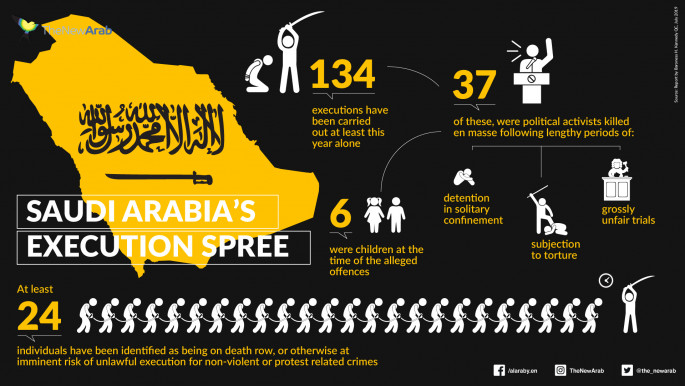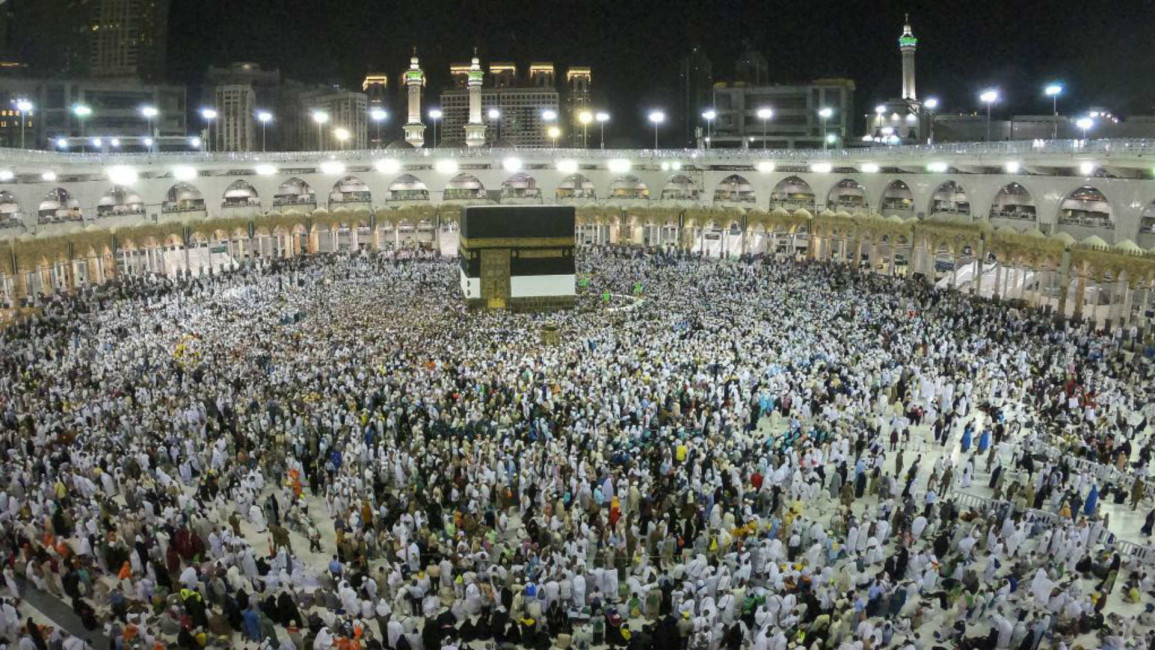
From speaking out to boycotting the Hajj, Muslims are pushing back against Saudi atrocities
They are calling on Muslims world-wide to refuse to be made complicit by indirectly funding its ability to continue to spread reaction across the Muslim world.
Growing up, it felt like any criticisms levelled at Saudi Arabia, would remain strictly behind closed doors, and should they be expressed in public, could mean being banned from fulfilling an Islamic duty.
But more recently, as the knowledge of Saudi's crimes – which is an incredibly long and horrifying list – grows, so too, has the vocal and public outrage from Muslims and non-Muslims alike. This has much to do with the kingdom's recent actions, which it has been unable to brush under the rug.
Many of us watch the daily bloody war that Saudi has waged on Yemen, which has left millions starving to death, fighting off disease breakouts of unimaginable proportions, all the while dealing with the total destruction of much of the country's infrastructure.
The butchering of critical Saudi journalist Jamal Khashoggi at the Saudi consulate in Istanbul was also too important for the world to ignore, as it shed light on the country's ongoing campaign against dissenting voices – or those closest to them. Arrests, torture, forced disappearances and death sentences just seem like common practice for Saudi rulers.
 |
Saudi Arabia's role in counterrevolutionary waves in the Middle East and North Africa since the breakout of the revolutions in 2011 has brought to light its hand in reinforcing dictatorial regimes |  |
In addition to all this, Saudi Arabia's role in counterrevolutionary waves in the Middle East and North Africa since the breakout of the revolutions in 2011 has also brought to light more obviously than before its hand in reinforcing dictatorial regimes and undermining social movements for democracy, social justice and freedom. An approach once again demonstrated in their support for the military crackdown against peaceful protesters in Sudan.
The kingdom's repeated failure to support Muslims in China facing horrendous persecution or its increasing refusal to support Palestinian demands for liberation – even rhetorically – point in the same direction.
When one considers what is in fact but a few of Saudi Arabia's sins, it is very difficult to then discard these factors for the purpose of a spiritual trip which to my mind hopes to strengthen our sense of purpose as Muslims and catapult us into actively serving God by speaking up and fighting injustices and inequalities. Isn't speaking truth in the face of an oppressor and striving for justice and a better world a central obligation for any Muslim?
Read more: Nicki Minaj just schooled western leaders in saying no to Saudi petrodollars
Article continue below infographic
It is then not irrelevant that around $12 billion of the country's GDP comes from the pilgrimmage industry. This means that a Hajj trip will inevitably financially contribute to the Saudi regime's financial power. Ignoring this reality will not make it any less true.
Yet I don't believe in applying the blame on the shoulders of over 1.6 billion Muslims around the world who seek to fulfil their religious duties, because it is the regime that has built and sustained such a system. It has insured that performing Hajj, also means complicity through the money spent, and the legitimacy that is brought by millions travelling to the holy land. Still, at some point, we have to make a choice: can performing an individual duty overrule our collective reason to exist?
Actions and consequences
|
Spiritually, it is as necessary for us to understand the consequences of our actions and engage in discussions like #BoycottHajj. Muslim institutions should not be exempt from this. Just recently, the Libyan Grand Mufti, Sadiq al-Gharawani, a renowned Sunni religious scholar, echoed the call stating that the money paid would "help Saudi Arabian rulers to carry out crimes against our fellow Muslims". He considers it a religious duty to refuse to be made complicit.
The fact that such an important figure has echoed these calls within the Sunni world is of considerable importance and points to a wider shift in the politics of our religious world.
In addition, it is of course crucial to point out how Western complicity, from the UK to the US, has also played a considerable role in empowering the Saudi regime, through special trade deals, close diplomatic relations, and massive arms sales to the regime, despite (or because) its well documented crimes.
The UK is the second largest arms seller, and one of its most profitable relationships is with Saudi Arabia. That means the British government, also has to be held accountable over the literal ammunition it provides for the crimes committed by the kingdom. This means we also have a responsibility to make a change here at home.
It may seem like the task is considerable, and even, that the monsters are undefeatable, but countless people around the world are committed to the fight. Whether because on religious or political conviction (or both), activists and writers are standing up and mobilising.
The recent success of the Campaign Against Arms Trade (CAAT) at the UK Court of Appeal which found that British arms sold to Saudi which were used on civilians in Yemen, was unlawful, is but one example. The achievement of activists in the Labour Party to pass a resolution stating that the party in power would end arm sales to both Israel and Saudi Arabia is another.
There are numerous avenues open to us, and all of them should be taken. The pressure should be applied from as many angles as possible, at the same time. But one thing is for sure: whichever strategies we espouse, it is crucial that we recognise the link between our government, our religious institutions, and our most holy practices to the destructive, murderous, and reactionary politics of the Kingdom of Saudi Arabia.
It is therefore incumbent upon us, as Muslims, as people of conscience, and as fighters for a better tomorrow to do everything in our power to end their ability to continue.
Malia Bouattia is an activist, a former president of the National Union of Students, and co-founder of the Students not Suspects/Educators not Informants Network.
Follow her on Twitter: @MaliaBouattia
Opinions expressed in this article remain those of the author and do not necessarily represent those of The New Arab, its editorial board or staff.




